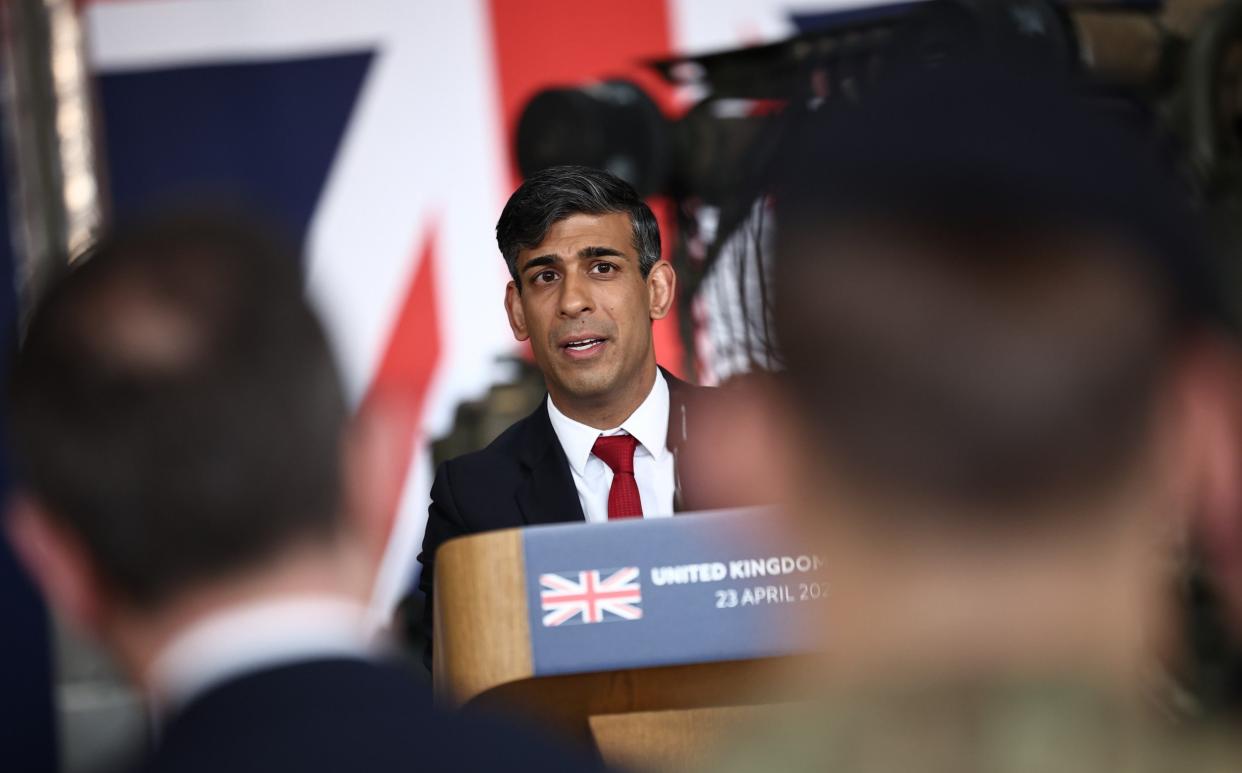Britain has just cemented its role as Europe’s leader in the battle against tyrants

- Oops!Something went wrong.Please try again later.
- Oops!Something went wrong.Please try again later.
- Oops!Something went wrong.Please try again later.
Gaza, Ukraine, Iran, the Red Sea, Africa, the South China Sea. The list of conflicts and adversaries is growing. Without hard power to complement soft power, the UK would risk its leadership and its ability to deter our enemies. We live in an increasingly dangerous world. As security minister and then secretary of state for defence, I saw the threats to our country at first hand: the dangers posed by a revanchist Russia, an aggressive Iran, an expansionist China, and terrorist groups that remain determined to cause us harm and establish bases in weak and vulnerable states.
This is why I consistently argued as defence secretary that we must spend more on our security. I’m proud that, with the backing of the then prime minister Boris Johnson and the then chancellor Rishi Sunak, I secured £24 billion extra for defence. We also led the world in supporting Ukraine, sending weaponry that was vital to thwarting Vladimir Putin’s invasion.
But the world is only getting more dangerous, and Putin is not done yet. So, I am delighted that Rishi Sunak has guaranteed that defence spending will increase every year, reaching 2.5 per cent of GDP by 2030, and that this will be the new baseline for our defence budget. This will mean an extra £75 billion in defence spending by 2030, cementing our position as the leading security power in Europe and the biggest contributor to Nato after the United States. Combine this extra investment, which starts today, with the additional £500 million for the front line in Ukraine, and the money will start making a difference to our security in the coming weeks and months.
Our most immediate task is to support Ukraine. If Putin succeeds, he won’t stop there. So, he must fail. The UK’s extra aid and the supplemental package that the US Congress finally passed last week will give the brave Ukrainians the ammunition and weaponry they require to continue resisting the Russians.
We should remember that Putin planned to take Ukraine in three days. Thanks to the bravery of the Ukrainians and the training and British kit that we sent in the months leading up to the invasion, he failed in that objective. This so-called “special military operation” has now been going on for two years, costing Russia 50,000 troops and a third of its Black Sea fleet. Yes, we are currently in an attritional phase of the war, but Ukraine has the will and the leadership to win.
But one lesson of this war is that we need to be able to produce munitions more quickly. It is absurd that North Korea has supplied more shells to Russia than European states have to Ukraine in recent months. So, I particularly welcome the Prime Minister’s determination to grow our defence industrial base here at home.
The £10 billion that Grant Shapps is investing in our munitions strategy over the next 10 years will give our own defence industry the certainty it needs to ramp up production. It will make the United Kingdom the arsenal of European democracy and create jobs across the country.
I hope that the Prime Minister’s leadership on this issue will lead to other Nato members following suit. If we can make 2.5 per cent the new baseline for Nato, that would lead to a £140 billion boost to allied defence spending which would help deter our enemies and defend our values. This increase would also send a powerful message to the American people that the other members of the alliance are shouldering their share of the burden.
When I stepped down as defence secretary, I made clear my worries about where the world might be by 2030. The Prime Minister is right that there is an axis of authoritarian states that is determined to challenge the rules of the global road. We can see that in Putin’s attempt to change borders by force, China’s activities in the South China Sea, and Iran’s efforts to destabilise the Middle East and disrupt global commerce. So, we must commit the resources we need to deter these threats and stand up for our values. This increase in our defence budget is the best step Britain can take to prevent future conflict.
The Prime Minister’s determination to grow the defence budget is only possible because he made tough choices about his priorities and knew that no economy can grow without a secure and stable environment. The Prime Minister’s commitment is fully funded and will be done without increasing debt and borrowing. The contrast with a Labour Party that would endanger our financial security with its unfunded promises, our energy security with its ban on British oil and gas, and which twice tried to make Jeremy Corbyn prime minister could not be more stark.
Rishi Sunak’s decision to back the men and women of the Armed Forces with continuing and growing funding should be saluted. It shows that he is the right man at the right time.
Ben Wallace is a former defence secretary

